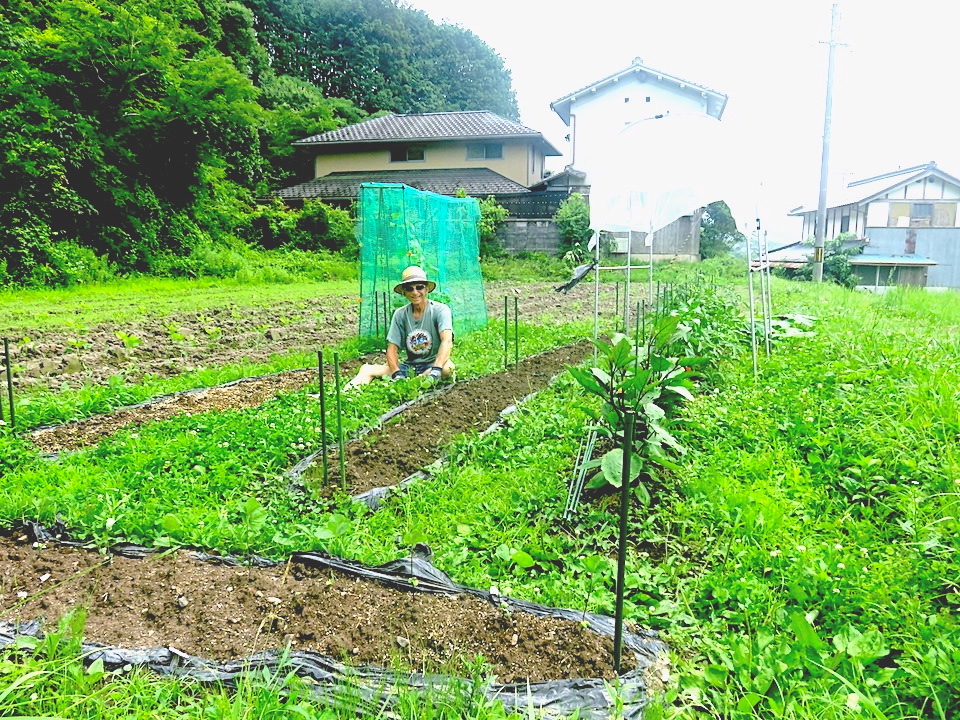
Gardens are the thing here in Japan, especially vegetable gardens.
Growing food for personal consumption is such a part of Japanese culture, even in Tokyo, by population the largest city in the world,
there are plot-share farms, rooftop gardens, and
at least one major company that devotes a significant amount of its office floor space to growing an impressive variety of fruits and vegetables.
It's commonly known that land use by the Japanese is extremely efficient, meticulous, ingenious. Everything I've experienced here over 12 years, substantiates that. Even out here in the sticks where I live, hardly under the pressures associated with the population density of cities, every patch of terra firma is treated as a valuable asset.
It's entirely obvious why this is the case. Compare Japan with the United States.
While both are highly-industrialized, complex and extremely modern societies, with very mobile populations, large cities, vast swaths of land allocated to industrial-service sectors and for housing millions of people, Japan comes up short from the get go. The total area of the U.S. is 3,531,905 square miles (9,147,592 square km). Japan is only 145,925 square miles (377,944 square km). Meaning it's just over 4% of the size of the U.S. -- Japan is about the size of Montana, just one of the 50 U.S. states.
Yes, Japan has fewer people. The U.S. now has just over 330 million people, Japan just under 127 million. It's still vastly disproportionate: Japan's 38% of the U.S. population must use land that is at best about 4% the size of America, a continental landmass which stretches sea to shining sea, embracing vast undeveloped, underdeveloped and natural tracts in between. Visit states like Wyoming, Nevada, Utah, Montana, Arizona, New Mexico, North and South Dakota, Texas, and you'll see what I mean.
Moreover, a considerable amount of land in Japan consists of mountainous terrain. Japan was formed in ancient times by volcanoes. While this offers beautiful landscapes and good trekking, the short of it is that there's much less usable land in Japan. Much less! Only 12% of the land in Japan is arable, compared to 20% for the U.S.
So Japanese put every square meter they do have to good use, and make it work for them.
Add to that the nutritional benefits of eating food that's not produced by factory farming, but grown in small amounts without machinery and a minimum -- sometimes none at all -- of chemicals. The result is in Japan, vegetable gardens are ubiquitous. Here in my own community of
Sasayama, it seems like everyone has a vegetable garden.
Even yours truly gets in on the action from time to time. As a city-boy born and raised in the industrial heartland of Detroit, Michigan I have to confess to a bit of awe when a seed or two actually sprouts, grows, and I end up with the fruits and vegetables of my personal labor on the dinner table. Here is the
naked American getting things ready to plant some seedlings.

That was last season, working our vegetable row, a single strip my wife and I rent from a neighbor. We ended up with tomatoes, bell peppers, zucchini, eggplant, onions, garlic, a couple melons which got stolen by some local monkeys, then late in the season soybeans.
Credit where it's due: Masumi actually knows what she's doing. I pretty much defer to her on anything agricultural. On the other hand, she doesn't know how to rebuild a Ford V-8 engine. We each have our specialties.


[ This originated at the author's personal website . . .
https://jdrachel.com ]
Life In Japan: Vegetable Gardens

